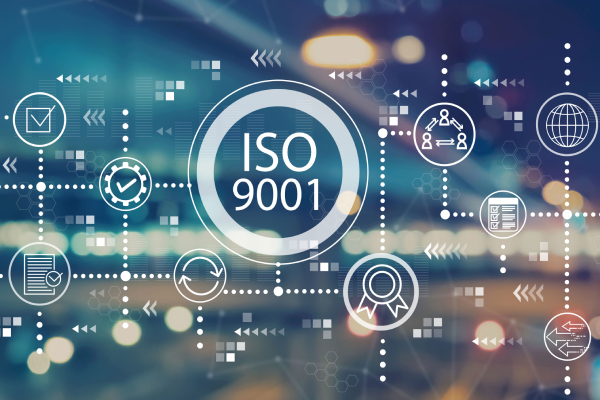ISO 9001 - Quality Management Systems
ISO 9001 certification enhances products and services, increasing company competitiveness on the market
 The ISO 9001 standard specifies the requirements that a quality management system must possess and be effective to demonstrate the ability of an organization to be able to provide products or services that comply with the requirements of its customers, as well as the applicable mandatory regulations. The adoption of a quality management system is a strategic risk prevention and management tool ("Risk-based thinking") that aims at customer satisfaction, increasing the value of services and products and improving business performance.
The ISO 9001 standard specifies the requirements that a quality management system must possess and be effective to demonstrate the ability of an organization to be able to provide products or services that comply with the requirements of its customers, as well as the applicable mandatory regulations. The adoption of a quality management system is a strategic risk prevention and management tool ("Risk-based thinking") that aims at customer satisfaction, increasing the value of services and products and improving business performance.
The ISO 9001 certification is aimed at any type of public or private organization, of any sector and size, manufacturing or services and, since it is the only standard of the ISO 9000 series according to which it is possible to issue a certification of conformity of a management system, it can have contractual value.
Regulatory focus
ISO 9001 is the reference standard for the certification of quality management systems, belonging to the ISO 9000 series of standards.
In 2012, the International Organization of Standardization (ISO) established that management system standards should have a common structure, called High Level Structure (HLS), applicable to new ISO standards and future revisions of existing standards. The standard therefore consists of 10 chapters, among which, the sequence of chapters 4 to 10 (those containing the requirements) is based on the Deming cycle (Plan-Do-Check-Act). The introduction of the High Level Structure (HLS) has made it possible to make the new ISO standards more easily integrated with each other.
As outlined in ISO 9000, quality management is based in particular on seven principles:
- Customer focus
- Leadership
- Active participation of people
- Process approach
- Improvement
- Evidence based decision-making
- Relationship Management
Particular attention is paid to the management of internal and external relations, thanks to the assessment of risk and opportunity aspects related to the context.
In addition, the concept of leadership of top management has become fundamental within the standard for the effectiveness of the quality management system, as a continuous support and example for the promotion and involvement of staff on aspects of attention to quality.
Risk-based thinking
Risk-based thinking aims to increase confidence in the ability of organizations to regularly provide their customers with products and services that meet their requirements and needs. Having a risk-based thinking involves the analysis of the risks related to the variability and complexity of the context in which the company and its processes operate, the examination of how to deal with them and the implementation of actions aimed at mitigating them.
Preventive action is therefore no longer an isolated tool but is a constant thought integrated into one's quality management system.
Certification process
- Completion of the information questionnaire;
- Receipt of the technical-economic offer which, once accepted, constitutes the contract for the provision of the service;
- Carrying out audit activities (on-site and/or off-site) and related release of final report;
- In case of success of the previous phases, the certification is evaluated by a Technical Committee;
- In case of success of the previous phases, issue of the certificate of conformity;
- Annual audit for the maintenance of the certificate.
Following the issuance of the certificate, the "Surveillance Verifications" must be carried out annually from the date of the first certification. The duration of ISO 9001 certification is 3 years, renewable at the end of the three-year period.
The benefits of certification
The advantages of ISO 9001 certification consist in obtaining a certificate issued by an independent body, officially recognized, which testifies to the effective compliance of the company's quality management system with the requirements of the ISO 9001 standard. An organization that chooses to adopt a quality management system is able to differentiate itself from unqualified competitors and increase its visibility and competitiveness, ensuring a greater orientation of all functions towards the final result and greater attention to the internal and external customer.
Why choose RINA?
RINA is accredited by ACCREDIA, ANAB worldwide for the issue of certificates of conformity to ISO 9001, for various product sectors and for the certification schemes connected to it and also has several local accreditations in different countries (eg INMETRO, RENAR...). RINA is also a global company, leader in the certification sector that bases its work on the excellence and experience of its professionals. It demonstrates a competence recognized at national and international level, dealing not only with quality certification, but also with a wide range of regulations, operating in total transparency and professionalism.